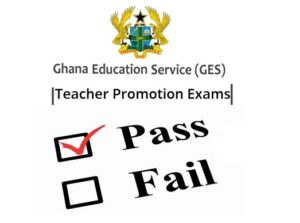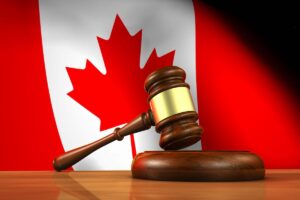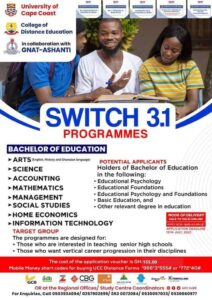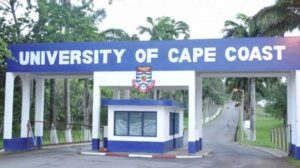Summary Of The History Of Education Reforms In Ghana
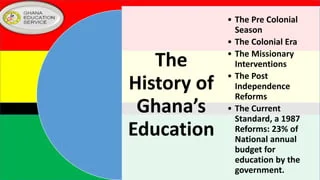
Education In Ghana
Education is the act of transferring knowledge in the form of experiences, ideas, skills, customs, and values, from one person to another or from one generation to generations. Education is widely acknowledged as the foundation of civilization and development. Reform is used to describe changes in policy, practice or organization.
Pre-Colonial Times
In precolonial times, education in Ghana was informal. Knowledge and competencies were transmitted orally and through apprenticeships. The arrival of European settlers during the 16th century brought new forms of learning; formal schools appeared, providing a book-based education.
Education After Independence
Ghana obtained its independence in 1957. The new government of Nkrumah described education as the key to the future and announced a high level university providing an “African point of view”, backed by a free universal basic education. In 1961, the Education Act introduced the principle of free and compulsory primary education.
Dozbo Committee Reforms
The year 1974 saw attempts of reforms. Based on the “Dozbo committee report”, they followed 2 goals: reducing the length of pre-tertiary education (The structure primary school/Junior High School/Senior High school was created) and modifying programs in order to promote more practical contents at school. Those reforms were, however, very partially implemented due to financial limitations and political instability.
The 1987 Education Act
The year 1987 marked the beginning of new series of reforms: The 1987 Education Act aimed at turning the 1974’s Dozbo committee measures into reality: a national literacy campaign was launched, pre-tertiary education was reduced from 17 to 12 years and vocational education appeared in Junior High School. Education was made compulsory from 6 to 14. The reform succeeded in imposing a new education structure, as well as to increase the enrollment and the number of infrastructure. Yet the promise of universal access to basic education was not fulfilled. Vocational programs were also considered as a failure.
Education Reforms Under Rawlings Leadership
The return to constitutional rule in 1992, though still under Rawlings government, gave a new impulse by reclaiming the duty of the state to provide a free and compulsory basic education for all. The local government Act of 1993 initiated the decentralization in education administration, by transferring power to district assemblies. The Free, Compulsory and Universal Basic Education(FCUBE) provided an action plan for the period 1996-2005, focusing on bridging the gender gap in primary-school, improving teaching materials and teacher’s living condition. It was later completed by significant acts, like the creation of the “Council for Technical and Vocational Education and Training” in order to promote vocational education(2006), or the founding of the national accreditation board (2007), introducing a national accreditation for all tertiary level institution. In 2007-2008, the two years in Kindergarten were added to the free and compulsory education.
Education Reforms Under President John Agyekum Kuffour
Professor Josephus Anamuah-Mensah Committee
President John Agyekum Kuffour inaugurated a presidential committee to review the existing education system in Ghana under the chairmanship of Professor Josephus Anamuah-Mensah, Vice-Chancellor of University of Education, Winneba. The key principles underlying the introduction of this reform includes: formation of human capital for industrial growth, preservation of cultural identity/traditional indigenous knowledge or creativity and also improvements in science and technology.
The John Agyekum Kuffour led administration introduced a new education system which did not only to review the content of the system but also extended the duration of Senior High School from three (3) years to four (4) years. It is vital to note that, the first year in the SHS was dedicated to study “core subjects” such as English Language, Mathematics, Integrated Science, Information Communication Technology (ICT) and Social Studies. Recommendations made by the Anamuah-Mensah report were not entirely different from that of the 1987 reforms by Evans Anfom. The only difference was the inclusion of two (2) years Kindergarten into the Universal Basic Education hence making it eleven (11) years of Universal Basic Education. The Universal Basic Education was structured into two (2) years of Kindergarten, six (6) years of Primary Education, three (3) years of Junior High School (JHS).
Other major highlights of the reforms include the medium of instruction in Kindergarten and lower primary to be in Ghanaian Language. Also, emphasis was placed on Literacy, Numeracy and Creative Arts at the basic level and the change from three (3) years of Senior Secondary School (SSS) to four (4) years of Senior High School (SHS) . The committee’s ideology to this change of years in SHS is to ensure that teachers should be able to finish the syllabus and also give students adequate time to prepare for the West African Secondary School Certificate Examination (WASSCE).
It is worth to note that, the change in governance after the 2008 general elections saw the reversing of the earlier decision with respect to four (4) years in Senior High School back to three (3) years as it was under the Provincial National Democratic Council led by Flt.Lt. Jerry John Rawlings.
The Current System of Education In Ghana
Ghana operates on a 6-3-4-4 System, Primary School – 6 years, Junior Secondary/High School – 3 years, Senior Secondary School – 3 years University Bachelor’s Degree – 4 years.
Reforms proposed by the Education Sector Plan 2018-2030
In response to the 2018 educational reforms proposed by the Education Sector Plan 2018-2030, NaCCA developed and rolled-out the Standards-Based Curriculum for KG and Primary schools and the Common Core Programme for the Junior High Schools in September 2019 and January 2021 respectively. These curricula seek to equip all learners with core competencies, essential skills and values necessary for learners to become creative, honest and responsible citizens – nationally and globally.
The next stage is the development of the secondary education curriculum. As part of the curriculum development process, NaCCA began a series of stakeholder dialogues, in February 2022, on the development of Standards-Based Curriculum for the Senior High Schools. The purpose is to obtain the buy-in of all stakeholders to ensure an all-inclusive curriculum that will equip senior high school graduates with 21st century skills to prepare them for tertiary education, employment and lifelong learning.
The Standard Based Curriculum
Highlights of the Standard Based Curriculum include;
- Kindergarten, primary school, JHS, and SHS shall all be described as basic schools. JHS 1, 2, 3, and SHS 1 shall now be referred to as BS 7,8,9 and 10 respectively i. e. SHS 1 shall will be called BS 10
- All students in JHS 1 – SHS 1 shall run a Common Core Programme called CCP which comprises of 9 subjects; namely – Maths, Languages, Science, RME (stand-alone subject), Physical and Health Education (not examinable), Career Technology, Social Studies, Computing, and Creative Art and Design.
- A new examination called National Standard Assessment Test (NSAT) shall be conducted at Primary 2, 4, 6, and JHS 2. The NSAT 2 and 4 exams have been started already.
- BECE shall be replaced by placement exams at JHS 3 to enroll students into SHS 1.
- Students in SHS1 shall continue to run the common core programme for one year thus students into SHS1 shall not select Science, Busines, or Arts Programmes.
- At the end of SHS1, Students shall write Common Core Exams into SHS 2.
- At SHS 2, students will now have to select either a career-related programme which includes vocational and technical programmes, or high school Diploma programmes such as science, business, arts.
- This means Elective subjects shall start in SHS 2.
- Wassce will be replaced by university entrance exams at SHS 3.
- Students after successful completion of SHS 3 will be rewarded a Diploma Certificate instead of WASSCE certificate.
The Government of Ghana initiated some key education reforms to transform teaching and learning and improve educational outcomes under the Education Strategic Plan (ESP 2018-2030) which was approved by cabinet in November 2018. These reforms are expected to contribute to the goals of the ESP and the Sustainable Development Goals (SDG 4) and lead to the improvement of learning outcomes, especially at the pre-tertiary levels. The three main priorities of the education reforms are: Improved learning outcomes, enhanced accountability and equity at all levels of the education sector.
Education In The Future
Thriving in today’s fast changing world requires breadth of skills rooted in academic competencies such as literacy, numeracy and science, but also including such things as teamwork, critical thinking, communication, persistence, and creativity. These skills are in fact interconnected. As young people are better able to manage their emotions, their ability to focus helps them learn to read and by working on science projects together they learn how to collaboratively solve problems. This interplay of skills is central to both the concept of skills as well as to the educational strategies needed to help young people cultivate them. Ultimately, young people today must be agile learners, able to adapt and learn and unlearn new things quickly in a new fast-changing environment.
CONCLUSION
In short, the world is constantly changing. It always will be. But recognizing the nature of these changes is key to examining the current context in which we live, and the major changes to be expected in our future that should inform how we think of education today.
Making smart and effective investments in our education is critical for developing the human capital with the requisite 21st Century Skills required in this competitive global age. This is the only way our children can survive the future.
